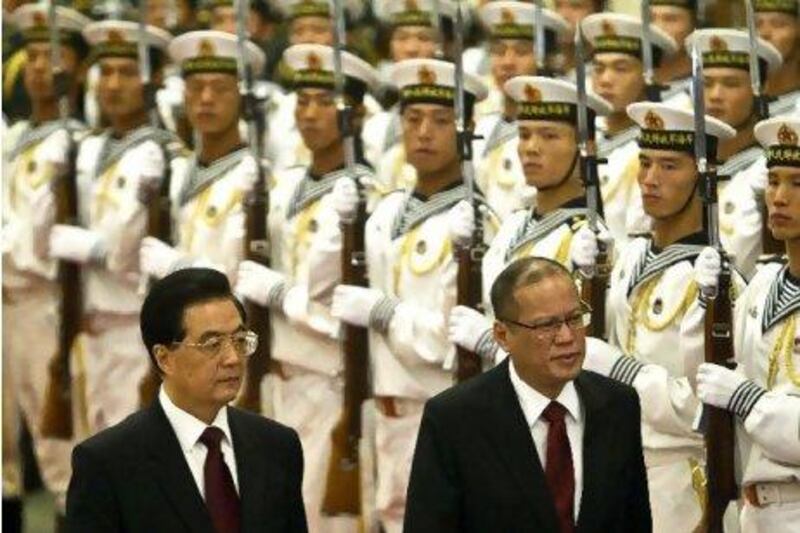BEIJING // The Philippine president, Benigno Aquino, finishes his trip to China today, capping a five-day visit that was meant to bolster economic ties but was dogged by tensions over the South China Sea.
Mr Aquino told reporters during his visit that discussions had helped China and the Philippines narrow their differences with respect to the waters. In May, Chinese vessels forced a ship belonging to an energy company to flee when it was carrying out work not far from the Philippines, the same month that a Vietnamese survey ship had its cables cut by the Chinese.
"Well, our positions previous to this were really so disparate," he said. "They were too far apart. But in this particular instance, there was that adherence to peaceful means, getting our people to talk together fully to come to a common framework of resolving the issue."
On his first visit to China since becoming the Philippine president a little more than a year ago, Mr Aquino was trailed by a 300-strong delegation of businesspeople keen to capitalise on the growing economic might of the world's most populous nation.
China is the Philippines' third-largest trading partner and last year the South-East Asian nation exported US$16.2 billion (Dh59.5 billion) worth of goods to the world's most populous nation.
Two-way trade, which grew by 35 per cent to $27.7 billion in 2010, could reach $60 billion in 2016, the Chinese vice-premier Wang Qishan said last week.
The Philippines, which has lagged behind its neighbours in development and has an economy a few per cent the size of China's, is also keen to secure Chinese investment, and the visit saw several agreements signed aimed at promoting economic ties.
Mr Aquino held talks in Beijing with his counterpart, Hu Jintao, and the Chinese premier, Wen Jiabao, and was in Shanghai yesterday.
Before flying home later today, Mr Aquino is to visit a site in Fujian province where his mother, Corazon Aquino, planted a tree during a visit she made to China in 1988 when she was president. Mrs Aquino could trace her roots to the south-eastern province.
While work was done to strengthen business links, tensions over competing claims in the South China Sea, known in the Philippines as the West Philippine Sea, hovered over Mr Aqunio's visit.
Malaysia, Vietnam, Taiwan and Brunei also dispute China's claims in the resource-rich waters.
Beijing has used patrol vessels to limit efforts by Philippine and Vietnamese interests to look for energy deposits.
Ding Xueliang, an international affairs specialist at Hong Kong University of Science and Technology, said Mr Aquino has often not dealt with the South China Sea dispute in a "straightforward" way.
"On the one hand [the Philippines] says something very nice to the [Chinese] government, but at the same time Philippine officials say harsh things about China when they meet with American officials," he said.
Because of this diplomacy, not everyone in China thought the red carpet should be rolled out for Mr Aquino.
Shan Renping, a columnist in the Chinese state-run Global Times newspaper, wrote on Thursday that Mr Aquino "should know that he is not welcomed by the Chinese public at the moment".
China, Shan said, must use its economic might as leverage in the dispute.
"Since we have the strength, we should use it publicly to shape East Asia," he wrote.
Mr Aquino said during his trip that Mr Hu had indicated he was keen on making a code of conduct in the South China Sea binding, although official confirmation of this from the Chinese side was conspicuous by its absence.
Alan Chong, a South East Asia security specialist at the S Rajaratnam School of International Studies in Singapore, said Mr Aquino's comments were unlikely to reflect the official Chinese position, since a binding agreement would give Manila international cover "when Beijing tries to rattle the sabre over the South China Sea".
"I would think Beijing would be more cautious than that," he said.
Overall, Mr Chong said the Philippines "cannot risk antagonising China too far, because they need Chinese capital to invest in their country", a need that was often mentioned during Mr Aquino's visit.






